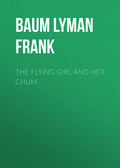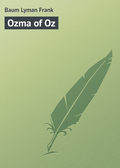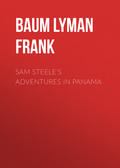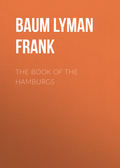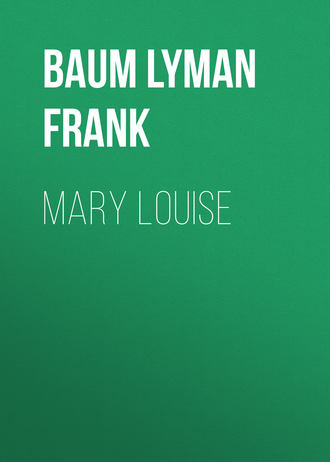
Лаймен Фрэнк Баум
Mary Louise
CHAPTER XIII
BUB SUCCUMBS TO FORCE
One day Peter Conant abruptly left his office, came home and packed his grip and then hurried down town and caught the five o'clock train for New York. He was glum and uncommunicative, as usual, merely telling Aunt Hannah that business called him away and he did not know when he would be back.
A week later Peter appeared at the family breakfast table, having arrived on the early morning express, and he seemed in a more gracious mood than usual. Indeed, he was really talkative.
"I met Will Morrison in New York, Hannah," he said to his wife. "He was just sailing for London with his family and will remain abroad all summer. He wanted us to occupy his mountain place, Hillcrest Lodge, during July and August, and although I told him we couldn't use the place he insisted on my taking an order on his man to turn the shack over to us."
"The shack!" cried Aunt Hannah indignantly.
"Why, Peter, Hillcrest Lodge is a little palace. It is the cosiest, most delightful place I have ever visited. Why shouldn't we accept Will Morrison's proposition to occupy it?"
"I can't leave my business."
"You could run up every Friday afternoon, taking the train to Millbank and the stage to Hillcrest, and stay with us till Monday morning."
He stared at her reflectively.
"Would you be safe in that out-of-the-way place?" he asked.
"Of course. Didn't you say Will had a man for caretaker? And only a few scattered cottages are located near by, so we shall be quite by ourselves and wholly unmolested. I mean to go, and take the girls. The change will do us all good, so you may as well begin to make arrangements for the trip."
Peter Conant stared awhile and then resumed his breakfast without comment. Mary Louise thought she saw a smile flicker over his stolid features for a moment, but could not be positive. Aunt Hannah had spoken in a practical, matter-of-fact way that did not admit of argument.
"Let me see," she resumed; "we will plan to leave on Thursday morning, over the branch road, which will get us to Millbank by noon. If you telegraph the stage-driver to meet us we can reach Hillcrest Lodge by three o'clock – perhaps earlier – and that will enable us to get settled before dark. That is far better than taking the afternoon train. Will you make the proper arrangements, Peter?"
"Yes," he briefly replied.
As he was leaving the house after breakfast he fixed his stare on Irene and said to her:
"In New York I ran across a lot of second-hand books at an auction sale – old novels and romances which you will probably like. I bought the lot and shipped them home. If they arrive in time you can take them to Hillcrest and they will keep you reading all summer."
"Oh, thank you, Uncle Peter!" exclaimed the chair-girl gratefully.
"Have you any – any – news of Gran'pa Jim?" asked Mary Louise diffidently.
"No," he said and walked away.
During the few days that remained before their exodus they were busy preparing for the anticipated vacation. Summer gowns had to be looked over and such things gathered together as might be useful during their two months' stay at Hillcrest.
"Of course no one will see us," remarked Aunt Hannah; "it's really the jumping-off place of the world; but Will Morrison has made it as cosy as possible and we three, with just Peter at the week-ends, can amuse one another without getting lonely. Peter will fish in the mountain streams, of course, and that's the reason he is allowing us to go. We've visited the Morrisons two or three times at the Lodge and Peter has fished for trout every minute he was there."
"Who are the Morrisons?" asked Mary Louise.
"Will Morrison is a rich banker and his wife Sallie was an old schoolmate of mine. The Lodge is only a little resort of theirs, you know, for in the city they live in grand style. I know you girls will enjoy the place, for the scenery is delightful and the clear mountain air mighty invigorating."
All girls delight in change of location and although Irene was a little worried over the difficulties of getting to Hillcrest Lodge in her crippled condition, she was as eager to go as was Mary Louise. And she made the trip more comfortably than she had feared.
At Millbank the stage-driver fixed a comfortable seat for her in his carryall and loaded the boxes and baggage and the wheeled chair and the box of books – which had arrived from New York – on the railed top of his bus, and then they drove away through a rough but picturesque country that drew from the girls many exclamations of delight.
Presently they came to a small group of dwellings called the "Huddle," which lay at the foot of the mountain. Then up a winding path the four horses labored patiently, halting often to rest and get their breaths. At such times the passengers gloried in the superb views of the valley and its farms and were never impatient to proceed. They passed one or two modest villas, for this splendid location had long ago been discovered by a few others besides Will Morrison who loved to come here for their vacations and so escape the maddening crowds of the cities.
Aunt Hannah had planned the trip with remarkable accuracy, for at about three o'clock the lumbering stage stopped at a pretty chalet half hidden among the tall pines and overlooking a steep bluff. Here the baggage and boxes were speedily unloaded.
"I gotta git back ter meet the aft'noon train," said Bill Coombs, their driver. "They won't be any more passingers in this direction, tain't likely, 'cause the houses 'roun' here is mighty scattered an' no one's expectin' nobody, as I know of. But in the other direction from Millbank – Sodd Corners way – I may catch a load, if I'm lucky."
So back he drove, leaving the Conants' traps by the roadside, and Peter began looking around for Morrison's man. The doors of the house were fast locked, front and rear. There was no one in the barn or the shed-like garage, where a rusty looking automobile stood. Peter looked around the grounds in vain. Then he whistled. Afterward he began bawling out "Hi, there!" in a voice that echoed lonesomely throughout the mountain side.
And, at last, when they were all beginning to despair, a boy came slouching around a corner of the house, from whence no one could guess. He was whittling a stick and he continued to whittle while he stared at the unexpected arrivals and slowly advanced. When about fifteen paces away he halted, with feet planted well apart, and bent his gaze sturdily on his stick and knife. He was barefooted, dressed in faded blue-jeans overalls and a rusty gingham shirt – the two united by a strap over one shoulder – and his head was covered by a broad Scotch golf cap much too big for him and considerably too warm for the season.
"Come here!" commanded Mr. Conant.
The boy did not move, therefore the lawyer advanced angrily toward him.
"Why didn't you obey me?" he asked.
"They's gals there. I hates gals," said the boy in a confidential tone.
"Any sort o' men critters I kin stand, but gals gits my goat."
"Who are you?" inquired Mr. Conant.
"Me? I'm jus' Bub."
"Where is Mr. Morrison's man?"
"Meanin' Talbot? Gone up to Mark's Peak, to guide a gang o' hunters f'm the city."
"When did he go?" asked the lawyer.
"I guess a Tuesday. No – a Wednesday."
"And when will he be back?"
The boy whittled, abstractedly.
"Answer me!"
"How kin I? D'ye know where Mark's Peak is?"
"No."
"It takes a week ter git thar; they'll likely hunt two er three weeks; mebbe more; ye kin tell that as well as I kin. Mister Will's gone ter You-RUPP with Miss' Morrison, so Talbot he won't be in no hurry ter come back."
"Great Caesar! Here's a pretty mess. Are you Talbot's boy?"
"Nope. I'm a Grigger, an' live over in the holler, yonder."
"What are you doing here?"
"Earnin' two bits a week."
"How?"
"Lookin' after the place."
"Very well. Mr. Morrison has given us permission to use the Lodge while he is away, so unlock the doors and help get the baggage in."
The boy notched the stick with his knife, using great care.
"Talbot didn't say nuth'n' 'bout that," he remarked composedly.
Mr. Conant uttered an impatient ejaculation. It was one of his peculiarities to give a bark similar to that of a dog when greatly annoyed. After staring at the boy a while he took out Will Morrison's letter to Talbot, opened it and held it before Bub's face.
"Read that!" he cried.
Bub grinned and shook his head.
"I kain't read," he said.
Mr. Conant, in a loud and severe voice, read Mr. Morrison's instruction to his man Talbot to do everything in his power to make the Conants comfortable and to serve them as faithfully as he did his own master. The boy listened, whittling slowly. Then he said:
"Mebbe that's all right; an' ag'in, mebbe tain't. Seein' as I kain't read I ain't goin' ter take no one's word fer it."
"You insolent brat!" exclaimed Peter Conant, highly incensed. Then he turned and called: "Come here, Mary Louise."
Mary Louise promptly advanced and with every step she made the boy retreated a like distance, until the lawyer seized his arm and held it in a firm grip.
"What do you mean by running away?" he demanded.
"I hates gals," retorted Bub sullenly.
"Don't be a fool. Come here, Mary Louise, and read this letter to the boy, word for word."
Mary Louise, marking the boy's bashfulness and trying to restrain a smile, read Mr. Morrison's letter.
"You see," said the lawyer sharply, giving Bub a little shake, "those are the exact words of the letter. We're going to enter the Lodge and take possession of it, as Mr. Morrison has told us to do, and if you don't obey my orders I shall give you a good flogging. Do you understand that?"
Bub nodded, more cheerfully.
"If ye do it by force," said he, "that lets me out. Nobody kin blame me if I'm forced."
Mary Louise laughed so heartily that the boy cast an upward, half-approving glance at her face. Even Mr. Conant's stern visage relaxed.
"See here, Bub," he said, "obey my orders and no harm can come to you.
This letter is genuine and if you serve us faithfully while we are here I'll – I'll give you four bits a week."
"Heh? Four bits!"
"Exactly. Four bits every week."
"Gee, that'll make six bits a week, with the two Talbot's goin' ter give me. I'm hanged ef I don't buy a sweater fer next winter, afore the cold weather comes!"
"Very good," said Mr. Conant. "Now get busy and let us in."
Bub deliberately closed the knife and put it in his pocket, tossing away the stick.
"Gals," he remarked, with another half glance at Mary Louise, "ain't ter my likin'; but FOUR BITS – " He turned and walked away to where a wild rosebush clambered over one corner of the Lodge. Pushing away the thick, thorny branches with care, he thrust in his hand and drew out a bunch of keys.
"If it's jus' the same t' you, sir, I'd ruther ye'd snatch 'em from my hand," he suggested. "Then, if I'm blamed, I kin prove a alibi."
Mr. Conant was so irritated that he literally obeyed the boy's request and snatched the keys. Then he led the way to the front door.
"It's that thin, brass one," Bub hinted.
Mr. Conant opened the front door. The place was apparently in perfect order.
"Go and get Hannah and Irene, please," said Peter to Mary Louise, and soon they had all taken possession of the cosy Lodge, had opened the windows and aired it and selected their various bedrooms.
"It is simply delightful!" exclaimed Irene, who was again seated in her wheeled chair, "and, if Uncle Peter will build a little runway from the porch to the ground, as he did at home, I shall be able to go and come as I please."
Meantime Aunt Hannah – as even Mary Louise now called Mrs. Conant – ransacked the kitchen and cupboards to discover what supplies were in the house. There was a huge stock of canned goods, which Will Morrison had begged them to use freely, and the Conants had brought a big box of other groceries with them, which was speedily unpacked.
While the others were thus engaged in settling and arranging the house, Irene wheeled her chair to the porch, on the steps of which sat Bub, again whittling. He had shown much interest in the crippled girl, whose misfortune seemed instantly to dispel his aversion for her sex, at least so far as she was concerned. He was not reluctant even to look at her face and he watched with astonishment the ease with which she managed her chair. Having overheard, although at a distance, most of the boy's former conversation with Uncle Peter, Irene now began questioning him.
"Have you been eating and sleeping here?"
"Of course," answered Bub.
"In the Lodge?"
"No; over in Talbot's house. That's over the ridge, yonder; it's only a step, but ye kain't see it f'm here. My home's in the South Holler, four mile away."
"Do you cook your own meals?"
"Nobudy else ter do it."
"And don't you get dreadfully lonesome at night?"
"Who? Me? Guess not. What the Sam Hill is they to be lonesome over?"
"There are no near neighbors, are there?"
"Plenty. The Barker house is two mile one way an' the Bigbee house is jus' half a mile down the slope; guess ye passed it, comin' up; but they ain't no one in the Bigbee house jus' now, 'cause Bigbee got shot on the mount'n las' year, a deer hunt'n', an' Bigbee's wife's married another man what says he's delicate like an' can't leave the city. But neighbors is plenty. Six mile along the canyon lives Doolittle."
Irene was delighted with Bub's quaint language and ways and before Mrs. Conant called her family to the simple improvised dinner the chair-girl had won the boy's heart and already they were firm friends.
CHAPTER XIV
A CALL FROM AGATHA LORD
Hillcrest Lodge was perched upon a broad shelf of the wooded mountain, considerably nearer to the bottom than to the top, yet a stiff climb from the plain below. Behind it was a steep cliff; in front there was a gradual descent covered with scrub but affording a splendid view of the lowlands. At one side was the rocky canyon with its brook struggling among the boulders, and on the other side the roadway that wound up the mountain in zigzag fashion, selecting the course of least resistance.
Will Morrison was doubtless a mighty hunter and an expert fisherman, for the "den" at the rear of the Lodge was a regular museum of trophies of the chase. Stag and doe heads, enormous trout mounted on boards, antlers of wild mountain sheep, rods, guns, revolvers and hunting-knives fairly lined the wails, while a cabinet contained reels, books of flies, cartridge belts, creels and many similar articles. On the floor were rugs of bear, deer and beaver. A shelf was filled with books on sporting subjects. There was a glass door that led onto a little porch at the rear of the Lodge and a big window that faced the cliff.
This sanctum of the owner rather awed the girls when first they examined it, but they found it the most fascinating place in all the house and Irene was delighted to be awarded the bedroom that adjoined it. The other bedrooms were on the upper floor.
"However," said Mr. Conant to Irene, "I shall reserve the privilege of smoking my evening pipe in this den, for here is a student lamp, a low table and the easiest chairs in all the place. If you keep your bedroom door shut you won't mind the fumes of tobacco."
"I don't mind them anyhow, Uncle Peter," she replied.
Bub Grigger helped get in the trunks and boxes. He also filled the woodbox in the big living room and carried water from the brook for Aunt Hannah, but otherwise he was of little use to them. His favorite occupation was whittling and he would sit for hours on one of the broad benches overlooking the valley, aimlessly cutting chips from a stick without forming it into any object whatsoever.
"I suppose all this time he is deeply thinking," said Mary Louise as the girls sat on the porch watching him, the day after their arrival, "but it would be interesting to know what direction Bub's thoughts take."
"He must be figuring up his earnings and deciding how long it will take to buy that winter sweater," laughed Irene. "I've had a bit of conversation with the boy already and his ideas struck me as rather crude and undeveloped."
"One idea, however, is firmly fixed in his mind," declared Mary Louise.
"He 'hates gals.'"
"We must try to dispel that notion. Perhaps he has a big sister at home who pounds him, and therefore he believes all girls are alike."
"Then let us go to him and make friends," suggested Mary Louise. "If we are gentle with the boy we may win him over."
Mr. Conant had already made a runway for the chair, so they left the porch and approached Bub, who saw them coming and slipped into the scrub, where he speedily disappeared from view. At other times, also, he shyly avoided the girls, until they began to fear it would be more difficult to "make friends" than they had supposed.
Monday morning Mr. Conant went down the mountain road, valise in hand, and met Bill Coombs the stage-driver at the foot of the descent, having made this arrangement to save time and expense. Peter had passed most of his two days' vacation in fishing and had been so successful that he promised Aunt Hannah he would surely return the following Friday. He had instructed Bub to "take good care of the womenfolks" during his absence, but no thought of danger occurred to any of them. The Morrisons had occupied the Lodge for years and had never been molested in any way. It was a somewhat isolated place but the country people in the neighborhood were thoroughly honest and trustworthy.
"There isn't much for us to do here," said Mary Louise when the three were left alone, "except to read, to eat and to sleep – lazy occupations all. I climbed the mountain a little way yesterday, but the view from the Lodge is the best of all and if you leave the road you tear your dress to shreds in the scrub."
"Well, to read, to eat and to sleep is the very best way to enjoy a vacation," asserted Aunt Hannah. "Let us all take it easy and have a good time."
Irene's box of books which Mr. Conant had purchased for her in New York had been placed in the den, where she could select the volumes as she chose, and the chair-girl found the titles so alluring that she promised herself many hours of enjoyment while delving among them. They were all old and secondhand – perhaps fourth-hand or fifth-hand – as the lawyer had stated, and the covers were many of them worn to tatters; but "books is books," said Irene cheerily, and she believed they would not prove the less interesting in contents because of their condition. Mostly they were old romances, historical essays and novels, with a sprinkling of fairy tales and books of verse – just the subjects Irene most loved.
"Being exiles, if not regular hermits," observed the crippled girl, sunning herself on the small porch outside the den, book in hand, "we may loaf and dream to our hearts' content, and without danger of reproach."
But not for long were they to remain wholly secluded. On Thursday afternoon they were surprised by a visitor, who suddenly appeared from among the trees that lined the roadway and approached the two girls who were occupying a bench at the edge of the bluff.
The new arrival was a lady of singularly striking appearance, beautiful and in the full flush of womanhood, being perhaps thirty years of age. She wore a smart walking-suit that fitted her rounded form perfectly, and a small hat with a single feather was jauntily perched upon her well-set head. Hair and eyes, almost black, contrasted finely with the bloom on her cheeks. In her ungloved hand she held a small walking-stick.
Advancing with grace and perfect self-possession, she smiled and nodded to the two young girls and then, as Mary Louise rose to greet her, she said:
"I am your nearest neighbor, and so I have climbed up here to get acquainted. I am Agatha Lord, but of course you do not know me, because I came from Boston, whereas you came from – from – "
"Dorfield," said Mary Louise. "Pray be seated. Let me present Irene Macfarlane; and I am Mary Louise Burrows. You are welcome, Miss Lord – or should I say Mrs. Lord?"
"Miss is correct," replied their visitor with a pleasant laugh, which brought an answering smile to the other faces; "but you must not address me except as 'Agatha.' For here in the wilderness formalities seem ridiculous. Now let us have a cosy chat together."
"Won't you come into the Lodge and meet Mrs. Conant?"
"Not just yet. You may imagine how that climb winded me, although they say it is only half a mile. I've taken the Bigbee house, just below you, you know, and I arrived there last night to get a good rest after a rather strenuous social career at home. Ever since Easter I've been on the 'go' every minute and I'm really worn to a frazzle."
She did not look it, thought Mary Louise. Indeed, she seemed the very picture of health.
"Ah," said she, fixing her eyes on Irene's book, "you are very fortunate. The one thing I forgot to bring with me was a supply of books, and there is not a volume – not even a prayer-book – in the Bigbee house. I shall go mad in these solitudes if I cannot read."
"You may use my library," promised Irene, sympathizing with Miss Lord's desire. "Uncle Peter brought a great box of books for me to read and you are welcome to share their delights with me, I believe there are fifty of them, at the least; but many were published ages ago and perhaps," with a glance at the dainty hands, "you won't care to handle secondhand books."
"This ozonic air will fumigate them," said Agatha Lord carelessly. "We don't absorb bindings, Irene, but merely the thoughts of the authors. Books are the one banquet-table whereat we may feast without destroying the delicacy or flavor of the dishes presented. As long as the pages hold together and the type is legible a book is as good as when new."
"I like pretty bindings, though," declared Irene, "for they dress pretty thoughts in fitting attire. An ill-looking book, whatever its contents, resembles the ugly girl whose only redeeming feature is her good heart. To be beautiful without and within must have been the desire of God in all things."
Agatha gave her a quick look of comprehension. There was an unconsciously wistful tone in the girl's voice. Her face, though pallid, was lovely to view; her dress was dainty and arranged with care; she earnestly sought to be as beautiful "without and within" as was possible, yet the twisted limbs forbade her attaining the perfection she craved.
They sat together for an hour in desultory conversation and Agatha Lord certainly interested the two younger girls very much. She was decidedly worldly in much of her gossip but quick to perceive when she infringed the susceptibilities of her less sophisticated companions and was able to turn the subject cleverly to more agreeable channels.
"I've brought my automobile with me," she said, "and, unless you have a car of your own, we will take some rides through the valley together. I mean to drive to Millbank every day for mail."
"There's a car here, which belongs to Mr. Morrison," replied Mary Louise, "but as none of us understands driving it we will gladly accept your invitations to ride. Do you drive your own car?"
"Yes, indeed; that is the joy of motoring; and I care for my car, too, because the hired chauffeurs are so stupid. I didn't wish the bother of servants while taking my 'rest cure,' and so my maid and I are all alone at the Bigbee place."
After a time they went into the house, where Miss Lord was presented to Aunt Hannah, who welcomed their neighbor with her accustomed cordiality. In the den Agatha pounced upon the books and quickly selected two which she begged permission to take home with her.
"This is really a well selected collection," she remarked, eyeing the titles critically. "Where did Mr. Conant find it?"
"At an auction of second-hand junk in New York," explained Irene. "Uncle Peter knows that I love the old-fashioned books best but I'm sure he didn't realize what a good collection this is."
As she spoke, Irene was listlessly running through the leaves of two or three volumes she had not before examined, when in one of them her eye was caught by a yellowed sheet of correspondence paper, tucked among the pages at about midway between the covers. Without removing the sheet she leaned over to examine the fine characters written upon it and presently exclaimed in wondering tones:
"Why, Mary Louise! Here is an old letter about your mother – yes, and here's something about your grandfather, too. How strange that it should be – "
"Let me see it!" cried Mary Louise, eagerly stretching out her hands.
But over her friend's shoulder Irene caught the expression of Agatha Lord – tense, startled, with a gleam of triumph in the dark eyes. It frightened her, that look on the face of one she had deemed a stranger, and it warned her. She closed the book with a little slam of decision and tucked it beside her in her chair.
"No," she said positively, "no one shall see the letter until I've had time to read it myself."
"But what was it about?" asked Mary Louise.
"I don't know, yet; and you're not to ask questions until I DO know," retorted Irene, calmly returning Miss Lord's curious gaze while addressing Mary Louise. "These are my books, you must admit, and so whatever I find in them belongs to me."
"Quite right, my dear," approved Agatha Lord, with her light, easy laugh. She knew that Irene had surprised her unguarded expression and wished to counteract the impression it had caused.
Irene returned the laugh with one equally insincere, saying to her guest:
"Help yourself to whatever books you like, neighbor. Carry them home, read them and return them at your convenience."
"You are exceedingly kind," answered Agatha and resumed her examination of the titles. Mary Louise had not observed the tell-tale expression on Miss Lord's face but she was shrewd enough to detect an undercurrent of ice in the polite phrases passing between her companions. She was consumed with curiosity to know more of the letter which Irene had found in the book but did not again refer to it in the presence of their visitor.
It was not long before Agatha rose to go, a couple of books tucked beneath her arm.
"Will you ride with me to Millbank to-morrow?" she asked, glancing from one face to another.
Mary Louise looked at Irene and Irene hesitated.
"I am not very comfortable without my chair," she said.
"You shall have the rear seat all to yourself, and it is big and broad and comfortable. Mary Louise will ride with me in front. I can easily drive the car up here and load you in at this very porch. Please come!"
"Very well, since you are so kind," Irene decided, and after a few more kindly remarks the beautiful Miss Lord left them and walked with graceful, swinging stride down the path to the road and down the road toward the Bigbee house.



